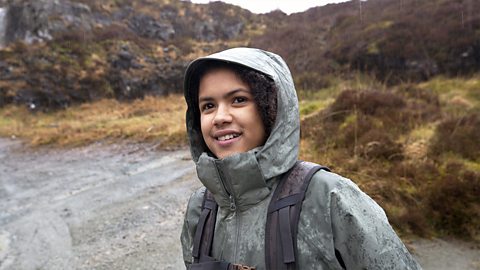Why do we need energy?
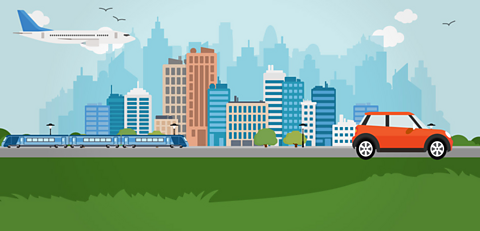
We need energy for our daily lives to power our homes, schools and businesses. We need energy to make trains go, cars run and planes fly.

Watch: Learn about the different forms of energy
Find out more about the different energy sources used in the UK.
We need energy to create gas and electricity, which is used to warm houses, cook food, drive cars, turn our lights on and power our devices. And one way to make energy is with wind.
Hi, Iâm Tianna, and Iâm at an onshore wind farm in Lancashire to find out about energy. Wind is a renewable energy source, because itâs something we never run out of.
Thatâs why in windy places like here, people build these big wind turbines that together make a wind farm. In fact - this is one of the oldest in the UK!
The wind makes the rotor blades turn, creating energy, which is transformed into electricity. Itâs then sent through connected cables to a power grid, and from there the electricity travels directly into peopleâs homes.
The wind turbines here provide enough electricity each year to power 6,000 homes!
There are wind farms across the UK⊠some are onshore like this one, but the biggest are offshore in the sea. They make around a quarter of all the energy we use.
The biggest farms in the world have thousands of turbines, so just think of how much energy they can make!
And a great thing about renewable energy sources, is they arenât as bad for the environment as non-renewable sources.
Coal, natural gas and oil are non-renewable energy sources, and they are taken from below the Earth in lots of different ways. They are used to make most of our energy in huge buildings called âplantsâ.
But this adds large amounts of carbon dioxide into the air, which is making the temperature of our planet rise. This can cause damage to nature and people. And weâre running out of these non-renewable sources. Thatâs why more wind farms are being built.
Weâre also improving ways of using other renewable energy sources, such as fast-running water called 'hydro power', using rays from the sun called 'solar power', and even heat from compost, called 'natural thermal power'.
But some people think we wonât be able to stop using non-renewable energy sources because of a lack of technology, high costs, people needing more energy and communities who depend on jobs created by coal, gas and oil. What do you think?
Natural Resources
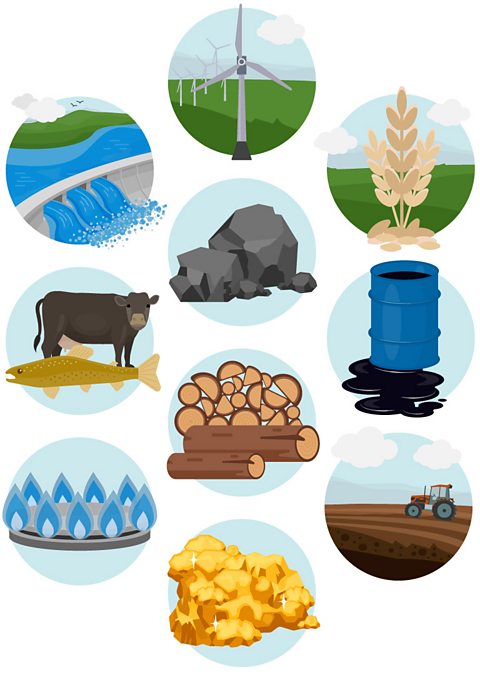
A natural resource is anything that people use that comes from nature.
Some of these are:
- Freshwater
- Air
- Fossil fuels
- Metals
- Minerals
- Soil
- Wood
Natural resources are distributed on the Earth unevenly, which means that there are different amounts of them in different places.
Humans need natural resources to survive. Many of the natural resources are used to produce energy.

How natural resources are used
Air, water and sun are all essential for life.
Crops grown on fields provide both people and animals with food.
Wood from trees is used for building, and sometimes for heating.
Coal, gas and oil are used to make fuel for machines and energy for heating. These are called fossil fuels.
Minerals provide people with raw materials, that are used for making new materials such as steel or glass in factories.
Natural resources in the UK
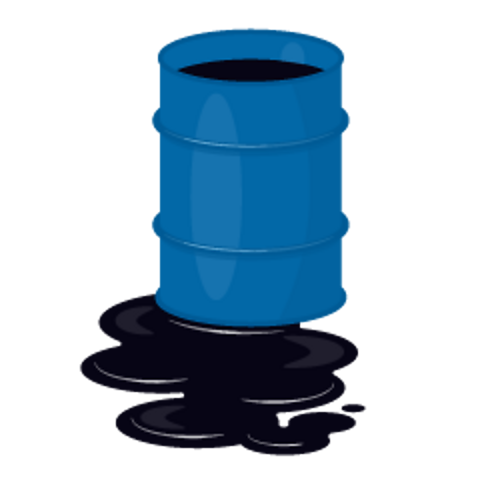
Since Industrial RevolutionImportant change which started in England in the 18th century and changed how things are made. Instead of making everything by hand, things were made by machines ran by steam-powered engines in factories. in the 18th century, the use of fossil fuels for machines has increased; coal mining in the UK allowed factories to modernise, while changing the landscape of the country.
The North Sea has large amounts of oil and natural gas beneath the seafloor. Oil rigs are platforms which are used for drilling into the sea floor to mine the fossil fuels.
There used to be many coal mines in the UK; today, most of these are closed.
North England and some parts of Scotland still have some active coal mines.

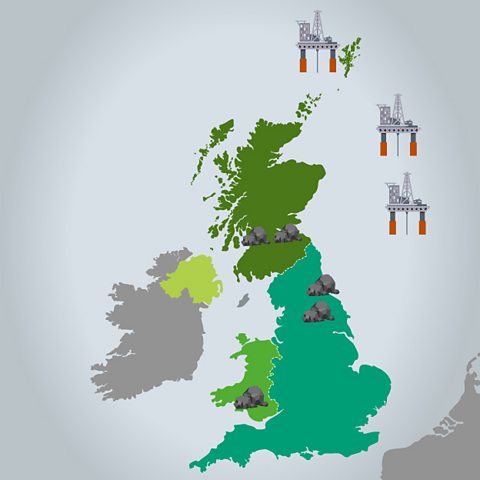
Non-renewable energy
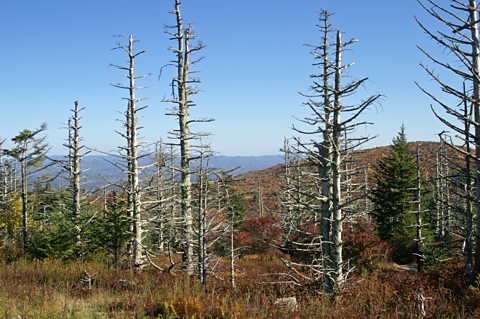
Most of the electricity in the UK is made by burning fossil fuels, which can have a negative impact on people and the environment. Cars, lorries and other vehicles using fossil fuels release harmful gases into the air.
- Poor air quality can have an impact on peopleâs health and cause illnesses.
- When burnt, fossil fuels release chemicals which pollute the air and can create acid rain. It can pollute lakes, rivers and land, destroying wildlife and damaging crops.
- The gases released during the burning of fossil fuels can also stop heat leaving the Earthâs atmosphere. This is called the greenhouse effect and because it makes our planet warmer, it can be harmful to the environment.

Renewable energy
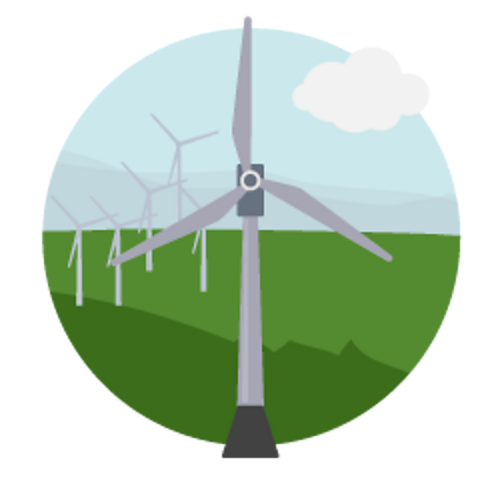
Some natural resources are limited, which means they will run out at some point.
Other natural resources can be replaced, and we call them renewable.
Nuclear energy is used in nuclear power plants to create heat and then electricity. The metal that is used during the process is a limited resource.
The need for natural resources and energy is increasing. To protect the Earth, people are exploring new, more sustainableUsing resources without causing too much harm and ensuring that they can be used in the future. ways of sourcing energy.
Here are some examples of renewable energy sources:

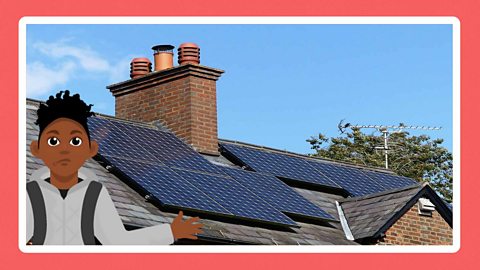
Image caption, Solar energy
The heat and light that the Sun gives can be collected and used for warming up homes and making electricity.
Image caption, Wind power
People have used the power of the wind for hundreds of years, building windmills to grind grain. Today, modern versions of these windmills are used, called wind turbines. A group of wind turbines is called a wind farm.
Image caption, Hydropower
Hydropower uses the energy of fast-flowing water to make electricity. Water from rivers, which is kept in water reservoirs by dams, makes a turbine spin. This produces electricity.
Image caption, Tidal power
Using the tide and waves is another way of using water to create electricity.
1 of 4
Activities
Quiz: Is it renewable?
Quiz: Renewable energy
How can we generate electricity from the sea?
GREEN CLASSROOM

Bitesize Primary games. gameBitesize Primary games
Play fun and educational primary games in science, maths, English, history, geography, art, computing and modern languages.

More on Geography of the UK
Find out more by working through a topic
- count17 of 17
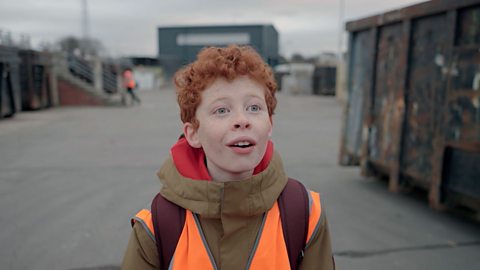
- count1 of 17
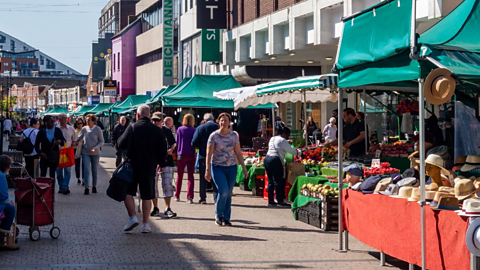
- count2 of 17
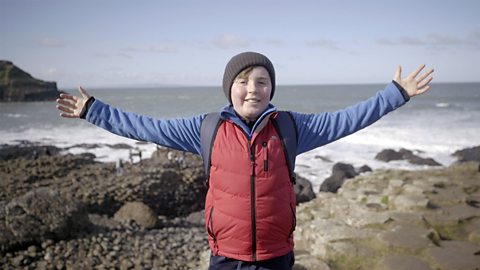
- count3 of 17
